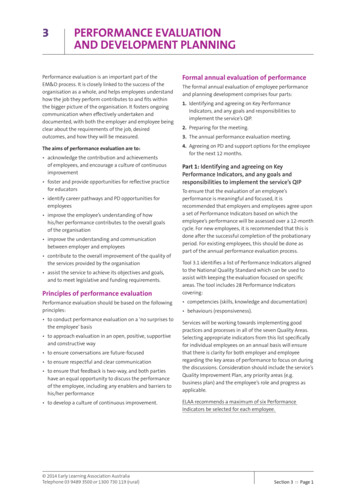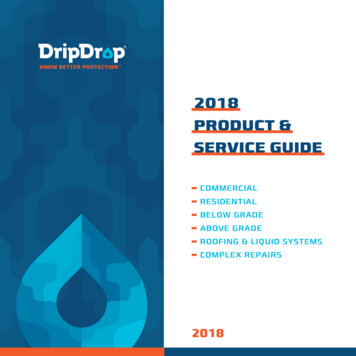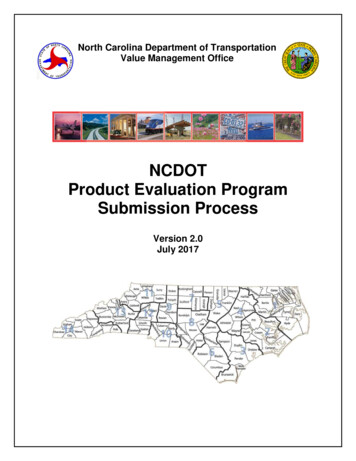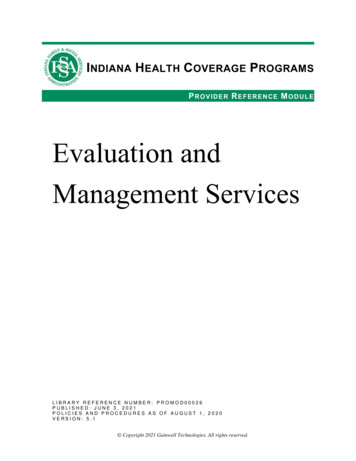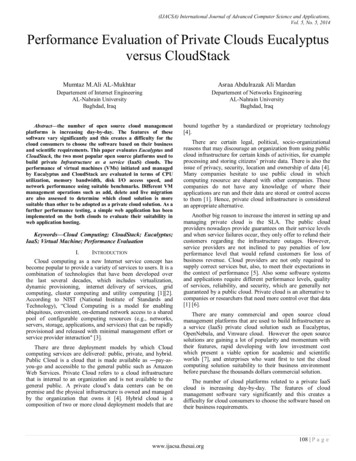
Transcription
Performance Evaluation ofBoards and DirectorsFor private circulationMarch 2014www.deloitte.com/in
2
Board EvaluationMounting stakeholders’ expectations, challenges facedby companies to operate under fluctuating economicconditions, pressures of globalisation and increasedregulatory requirements have brought the quality ofperformance of the Boards of Directors under greaterscrutiny. Boards have recognized that it would beimportant for them to continually assess how effectivelythey are performing their roles against the objectivesand the goals they have set for themselves. This growingrecognition has resulted in Board evaluations becomingwidely established internationally in rules-based as wellas in principles-based jurisdictions, as a critical structuraltool for assessing Board effectiveness and efficiency. Insome jurisdictions, the directors are also evaluated alongwith the Boards.Assessing Board EffectivenessThe Board performs three major roles in a company – itprovides direction (i.e. sets the strategic direction of thecompany), it controls (i.e. monitors the management)and provides support and advice (advisory role). Boardevaluation typically examines these roles of the Boardand the entailing responsibilities, and assesses howeffectively these are fulfilled by the Board.The effectiveness of the Board depends on a variety offactors, some of which are: Board Structure: its composition, constitution anddiversity and that of its Committees, competenciesof the members, Board and Committee charters,frequency of meetings, procedures; Dynamics and Functioning of the Board: annualBoard calendar, information availability, interactionsand communication with CEO and senior executives,Board agenda, cohesiveness and the quality ofparticipation in Board meetings; Business Strategy Governance: Board’s role incompany strategy; Financial Reporting Process, Internal Audit andInternal Controls: The integrity and the robustnessof the financial and other controls regarding abusiverelated party transactions, vigil mechanism and riskmanagement; Monitoring Role: Monitoring of policies, strategyimplementation and systems; Supporting and Advisory Role; and The Chairperson’s Role.The evaluation of the performance of the Boardsis essentially an assessment of how the Board hasperformed on all these parameters.Performance Evaluation of Boards and Directors3
Parameters of Board Evaluation Board and Committeecomposition and constitution Diversity Competencies of the members Board and Committeecharters Frequency of meetings Board processesBoardStructure Direction: Business strategygovernance Monitoring: Monitoring ofpolicies, systems and strategyimplementation Supporting and advisory roleBoard's Rolein GovernanceFinancialReportingDynamics and Process, Internal Integrity and Annual BoardFunctioningControls, Riskcalendarrobustness ofManagement Informationfinancial and othercontrolsavailability Risk management Interactions and Abusive relatedcommunication with CEO andparty transactionssenior executives Board agenda Whistle blower Cohesiveness and quality ofmechanismparticipation in Board meetings Chair person's role4
Evaluation methodologyIn most companies globally, Board evaluation is anannual exercise by choice or by regulatory prescription.The evaluation methodology and the process have somedegree of flexibility and international variance as well.The process is usually tailored to the requirement of thecompany, the specific situation it is in, the stage of thecompany’s lifecycle, the corporate structure, the Boardculture and the embedded processes. However, there isno common format, which is universally acceptable andapplicable to all companies.Outcomes of the Board evaluationThe outcomes of Board evaluation processes couldrange from relatively minor amendments to Boardprocesses, changes in Board composition andalterations in Committee structures to significant stepstowards rectifying the factors that contribute to Boarddysfunctionality. Delineating the findings of Boardevaluation is not enough. To be a meaningful exercise,the outcomes must result in an actionable plan. Theprocess of implementing the outcomes then naturallybecomes a crucial step in the entire evaluation processand should deserve the full attention of the Board andin turn of the management.Evaluation cyclesUnless otherwise prescribed by regulations, annualevaluation is the most commonly followed cycle forBoard evaluation. Most large corporations make theevaluation cycle consistent with the annual planningcycle adopted by Boards, others tie the evaluation tothe strategy formulation process. The Boards usuallydetermine the choice of the cycle.The process and analysis of Board evaluationInternal evaluations have many benefits, but in certaincircumstances, engaging an external independentexpert or consultant or advisor to facilitate the Boardevaluation process may work better. One view favouringindependent external evaluation is that the evaluationprocess becomes more independent and transparent.Internal evaluation tends to become mechanical, whilean external evaluator could bring in fresh perspectivesand approaches.In large international corporations, Board evaluations areusually conducted by the Governance and NominationCommittees with the help of outside experts. However,there are many companies, especially those in Europeand particularly in the UK, who advocate that theexercise should be conducted only by an independentexternal expert who would be in a better position tomake an independent assessment.Whether the evaluation is conducted internally orexternally by an independent expert, the methodologybroadly remains the same. Discussions about evaluationof the Board and its Committees are initiated in theBoard by the Chairperson and the consensus of theBoard obtained about the need for the evaluation andwhether the exercise should be conducted in house orwith the help of an independent external expert. Goodevaluations have quantitative and qualitative partsand usually the latter inform the evaluations with richdata, which brings greater objectivity to the evaluationexercise.Performance Evaluation of Boards and Directors5
The evaluation process involves identification ofareas for evaluation; formulating a questionnaireon the areas for evaluation; obtaining responses ofindividual directors to the questionnaire on a ratingscale; conducting interviews with individual directorsand analysing the responses to the questionnaire andinterviews; and reporting the findings resulting from theanalysis to the full Board. The Board deliberates on thereport, develops an action plan and periodically reviewsthe progress of implementation as well.Director’s evaluationWhile there are no two opinions on Board evaluation,opinion is still divided on whether performanceevaluation of individual directors is a valuable exerciseor whether it can inhibit Board dynamics and groupperformance.Director’s evaluation differs from the Board evaluationin several respects, though the evaluation methodologyand the processes followed are largely similar. Bothprocesses have qualitative and quantitative parts –questionnaire responded on a rating scale followedby interviews – but the parameters of evaluation maydiffer. For example, parameters for director evaluationcould be contribution of the director to the Board’s6strategic thinking, leadership and commitment ofthe director, participation in Board and Committeemeetings, communication and interpersonal skills ofthe director, ethical issues and dilemmas faced by thedirector and relationship of the director with the seniormanagement.Director’s evaluation could be a self-evaluation ora peer evaluation, but many companies may havesome reservations with peer evaluation. It is thereforeimportant for Boards to build a consensus on theapproach to be followed.Status of Board evaluation in IndiaIn India, Board evaluation was a non-mandatoryrequirement under Clause 49 of the Listing Agreement,prior to the announcement of the Securities andExchange Board of India (SEBI) following its Boardmeeting on 13th February 2014, to amend the Clause49. A few progressive companies however had beenpursuing Board evaluation (and in some instanceseven peer evaluation of directors) voluntarily as theybelieved in its usefulness. In all these voluntary cases,the evaluation was led by the Chairperson and theassistance of independent external experts was seldomsought. The Companies Act, 2013 has mandated
that Board of every listed company and of such othercompany as may be prescribed, must carry out aformal annual performance evaluation of the Board,its Committees, and individual directors and reviewthe performance of the Chairperson. The rules for therelevant sections are currently awaited. The process andmethodology of evaluation has however been left opento the Boards but its responsibility has been assignedto the Nomination and Remuneration Committee.Subsequent to the announcement by SEBI, evaluationof Boards and Independent Directors will becomemandatory for all listed companies under the revisedClause 49 with effect from October 1, 2014.International practices for Board EvaluationsThe following table enumerates the practices related toBoard evaluation adopted in some developed as well asdeveloping nsThe U.K. CorporateGovernance CodeAnnual(i) The Board should undertake a formal and rigorous annual evaluation ofits own performance and that of its Committees and individual directors.(ii) Evaluation of the Board of FTSE 350 companies should be externallyfacilitated at least every three years (on a comply-or-explain basis).U.S. NationalAssociation ofCorporate Directors(NACD)RegularlyThe Governance Committee is responsible for ensuring that a process existsfor the Board to routinely assess its own performance and the performanceof its Committees, as well as for each director to perform a self-assessment.IBGC Code of BestAnnualPractices (BrazilianInstitute of CorporateGovernance)(i) A formal evaluation process of the performance of the Board, ofindividual directors and of the CEO.(ii) The process shall be conducted by the Chair.(iii) The participation of an outside expert may contribute to theeffectiveness of the process.(iv) Evaluation system shall be adapted to each organization.(v) Disclosure of the process and of the evaluation results to theshareholders.CNV (Argentina’ssecurities regulator)AnnualA formal Board Evaluation.Mexican CodeNot definedPerformance evaluation of the Board and its members’ fiduciary duties.OECDAnnualBoard of listed companies should undergo annual internal evaluationscovering both the competencies and performance of their members as wellas the Board’s functioning as a whole.Performance Evaluation of Boards and Directors7
Performance evaluation requirements under theCompanies Act 2013New provisions applicable to the boards of listedcompanies and every other public limited companyas prescribed by the draft RulesDisclosure requirement in the Board’s report onperformance evaluationSection 134 (3) (p):Every listed company and any other class of publiccompanies as may be prescribed by the Rules, isrequired to make a statement in the Board’s reportindicating the manner in which formal evaluation hasbeen made by the Board of its own performance andthat of its committees and individual directors.Independent Directors’ role in performanceevaluation of Boards, non-executive directors andChairpersonSchedule IV Section II (2)Independent directors are required to bring anobjective view in the evaluation of the performanceof board and managementSchedule IV Section VIIThe independent directors are required to hold atleast one meeting in a year, without the attendanceof non-independent directors and members of themanagement and in that meeting they are requiredto review the performance of the non-independentdirectors and the Board as whole; and also reviewthe performance of the Chairperson of the company,taking into account the views of the executive andnon-executive directors.The Role of the Nominations and RemunerationCommittee in performance evaluation ofdirectorsSection 178 (2):The Nomination and Remuneration Committee ofevery listed company and any other class of publiccompanies as may be prescribed by the Rules, arerequired to carry out evaluation of every director’sperformance.Performance evaluation of IndependentDirectorsSchedule IV Section VThe reappointment of the independent directorswould be based on their performance evaluationreport.Schedule IV Section VIIIThe performance of the independent directors wouldhave to be done by the entire Board excluding thedirector to be evaluated and the continuance orextension of the independent director would bedetermined by the performance evaluation report.Implication of the new provisions for the BoardsNow that performance evaluation of the Board, itCommittees, directors and the Chairperson, havebecome mandatory for all listed companies and suchother companies prescribed by the Rules under theCompanies Act 2013 and for Boards and IndependentDirectors of all listed companies following the approvalby the Board of SEBI to amend the Clause 49, Boardswould have to become familiar with the concept as wellas the processes involved and the methodologies tobe adopted even if they may not have been practisingthese or may have had some reservations. Performanceevaluations are time consuming and often sensitivitiesinhibit the evaluation exercise. Boards will need to investconsiderable time and effort to make these exercisesfruitful for the organisations. These exercises willdemand high level of commitment and leadership skillsfrom the Chairperson. Besides, it is important to alwaysbuild a consensus in the Board on the entire evaluationexercise.8
Performance Evaluation of Boards and Directors9
Points to ponderInternationally, the performance evaluations are either conducted in house by the Chairperson, or the Governanceand Nomination Committee or by an external independent expert. In India, the intent of the Companies Act as wellas of the amendments to Clause 49 is that evaluations should be conducted by the Nomination and RemunerationCommittee. There appears to be no bar for the Board and the Nomination and Remuneration Committee to seek theassistance and guidance of external independent experts.The evaluations have quantitative part based on a questionnaire prepared after discussion with the Board and aqualitative part based on interviews with individual directors. It is common internationally to often seek assessmentinputs from the key management personnel. Whether the evaluations are to be carried out internally or with the helpof the independent expert is a question determined by the Board.In many countries evaluation of individual directors is not a regulatory requirement, though in India, the CompaniesAct 2013 requires evaluation of individual directors, independent directors and a review of the Chairperson’sperformance, for all listed companies and such other companies to be prescribed under the Rules. The amendedClause 49 would henceforth also require evaluation of Independent Directors of listed companies. The continuanceand reappointment of the Independent Director would be determined by the performance evaluation report.The process and the methodology to be followed in the evaluation of Boards and Independent Directors has been leftto the Board as it has not been laid down by the Companies Act 2013. The Boards also need to decide the nature andmagnitude of disclosures related to evaluations in the Board report.Even though the board and independent director evaluation have been made mandatory, Boards will be able to derivemaximum benefits from the evaluation exercises, only if they collectively believe in the evaluation exercise and itsability to help identify the strengths, weaknesses and opportunities of the Boards.For the evaluations to be successful and the process smooth, the Chairperson must be prepared to lead the exerciseand the Board shoulder the responsibility of managing both the process as well as the format of the evaluation.Considerable investment of time and effort are required on the part of the Board and the Chairperson.The performance evaluations must result in an action plan for the Board.Trust in the process and its confidentiality are critical for success of the evaluation exercise, for Trust is the bestincentive to encourage candid input and feedback from the Board members.10
Key contactsAbhay GupteSenior DirectorPhone: 91 (022) 6185 4360Email: agupte@deloitte.comSachin ParanjapeSenior DirectorPhone: 91 (022) 6185 4903Email: saparanjape@deloitte.comPerformance Evaluation of Boards and Directors11
Deloitte refers to one or more of Deloitte Touche Tohmatsu Limited, a UK private company limited by guarantee (“DTTL”), its network ofmember firms, and their related entities. DTTL and each of its member firms are legally separate and independent entities. DTTL (also referredto as “Deloitte Global”) does not provide services to clients. Please see www.deloitte.com/about for a more detailed description of DTTL andits member firms.This material and the information contained herein prepared by Deloitte Touche Tohmatsu India Private Limited (DTTIPL) is intended to providegeneral information on a particular subject or subjects and is not an exhaustive treatment of such subject(s).None of DTTIPL, Deloitte ToucheTohmatsu Limited, its member firms, or their related entities (collectively, the “Deloitte Network”) are by means of this material, renderingprofessional advice or services. The information is not intended to be relied upon as the sole basis for any decision which may affect you oryour business. Before making any decision or taking any action that might affect your personal finances or business, you should consult aqualified professional adviser.No entity in the Deloitte Network shall be responsible for any loss whatsoever sustained by any person who relies on this material. 2014 Deloitte Touche Tohmatsu India Private LimitedMember of Deloitte Touche Tohmatsu Limited
directors and the Board as whole; and also review the performance of the Chairperson of the company, taking into account the views of the executive and non-executive directors. Implication of the new provisions for the Boards Now that
